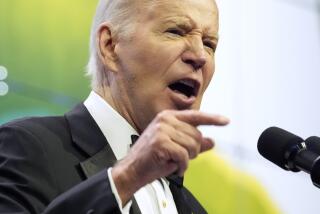Advocates of new Iran sanctions fail to advance key legislation
WASHINGTON – Despite intense lobbying, advocates of imposing new sanctions on Iran failed to advance key legislation in Congress this week, a sign that the Obama administration may have more support for its pleas of restraint than it appears.
Supporters of more penalties have been urging lawmakers to lose no time in approving measures that would take effect if Iran failed to fulfill the terms of an interim nuclear agreement signed last month in Geneva, or if Tehran dragged its feet in negotiations for a comprehensive accord.
The Obama administration sent Secretary of State John F. Kerry and other senior officials to Congress this week to persuade lawmakers to hold off for now, out of concern that it would drive Iran from the bargaining table or unravel the coalition of nations that have joined in the sanctions effort.
Under the deal reached with a diplomatic bloc made up of the United States, Britain, China, France, Germany and Russia, Iran agreed to freeze or roll back most of its nuclear program over the next six months in exchange for an estimated $6 billion to $7 billion in sanctions relief.
For years, there has been overwhelming support in Congress for imposing sanctions to persuade Iran to give up a program that the U.S. and other world powers fear is intended to develop a nuclear weapon. When Kerry argued his case before the House Foreign Affairs Committee on Tuesday, not one member spoke on his side.
Yet efforts to advance legislation before the holiday break suffered a series of setbacks.
The must-pass defense spending bill was adopted Thursday without any sanctions amendments, despite supporters’ hope that it could provide a quick route to enactment.
Plans for a bipartisan resolution calling for more penalties faltered on Thursday, when House Minority Whip Steny H. Hoyer (D-Md.) withdrew his support from an effort led Majority Leader Eric Cantor (R-Va.).
Sen. Tim Johnson (D-S.D.), chairman of the Senate Banking Committee, which has jurisdiction over sanctions-related bills, announced after many weeks of deliberations that he wanted to hold off for now. Johnson said Thursday that he was ready to move quickly if Iran didn’t fulfill its end of the bargain, but “a pause on new sanctions legislation is justified to see if such a deal is possible.”
Sens. Mark Steven Kirk (R-Ill.) and Robert Menendez (D-N.J.) , two longtime champions of sanctions, were expected to announce that they had prepared a bill with strong bipartisan support. But as of Friday afternoon, no such announcement had not been made.
An aide to a Democratic lawmaker said the week’s action shows that “behind all the noise, there is a core of support for holding off.” Nevertheless, he and other staffers and lobbyists predicted that the battle would be taken up anew when the House, which adjourns Friday, returns in January.
“There’s still huge energy around here to get something on paper,” said the aide, who declined to be identified because he wasn’t authorized to speak on the subject.
Sen. Bob Corker (R-Tenn.), the ranking member of the Senate Foreign Relations Committee, said some senators wanted to make it look like they were planning to slap on new sanctions when they had no such intention.
“I realize we’re sort of going to a rope-a-dope here in the Senate, and that we’re not actually going to do anything,” he said.
Sanctions advocates blamed the lack of progress on the influence of the White House and Democratic Senate leadership, as well as the reluctance of lawmakers to be seen siding against diplomacy, especially when the alternative could be another war in the Middle East.
Some argued that it would be easier to sell more sanctions if Iran drags its feet. One noted that Iranian officials began threatening Friday to pull back from preliminary talks in Vienna because the previous day the U.S. Treasury Department blacklisted 17 companies and individuals accused of helping Iran dodge sanctions.
Twitter: @richtpau
More to Read
Sign up for Essential California
The most important California stories and recommendations in your inbox every morning.
You may occasionally receive promotional content from the Los Angeles Times.











